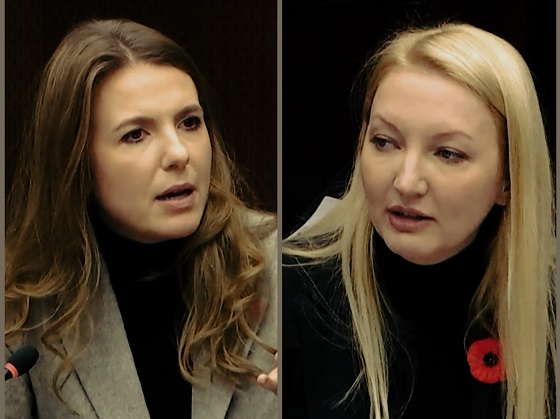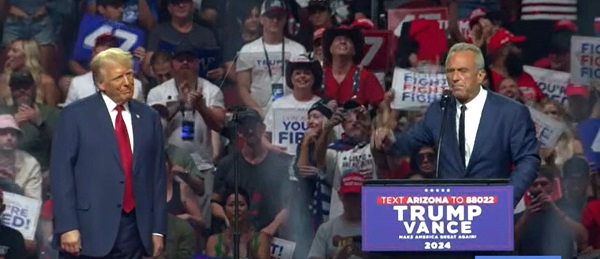National
Committee Hearing Exposes Trudeau’s Political Spin on Foreign Interference

In a Circus of Leaks, Double Standards, and Evasions, Conservatives Call Out the Trudeau Government for Putting International Optics Over Canadian Sovereignty
In Canada’s recent hearing with the Standing Committee on Public Safety and National Security (SECU) on alleged interference by Indian government-linked agents, what should have been a serious inquiry into national security turned into a Liberal-led circus of deflections, double standards, and selective outrage. The Trudeau government trotted out high-ranking officials—representatives from CSIS, the RCMP, the Privy Council Office, and Global Affairs Canada—who were there to answer for the alleged interference tactics targeting Canadians. And to top it off, they were asked why, instead of informing Canadians directly, they’d chosen to leak the intel to The Washington Post. Why were Canadians the last to know about threats on their own soil? And why did a foreign newspaper get the scoop on a story affecting Canadian sovereignty?
At issue were allegations that Indian agents had been involved in intimidation tactics and organized criminal activities targeting Canada’s Sikh community, particularly those sympathetic to the separatist movement. The committee also questioned why the Trudeau government’s response has been to selectively leak this information to American media, while keeping Canadians in the dark about similar threats from other foreign governments—particularly China.
The Leaks to The Washington Post: Information for Foreign Press, Silence for Canadians
Instead of informing Canadians directly, the Trudeau government decided it was a better idea to leak details about alleged Indian interference to The Washington Post, claiming it was to combat “misinformation” internationally. Let’s pause for a moment—this is Canada we’re talking about, and the government feels it’s necessary to share news about threats to Canadians with foreign media instead of Canadians themselves. That selective leak didn’t go unnoticed by Conservative MPs, especially Raquel Dancho. Dancho took the PCO to task, asking why, when it’s Indian interference, they rush to get the word out to American media, but when it comes to Chinese interference, they hide behind “national security.” Canadians watching this hearing saw the hypocrisy plain as day.
Then enter Jennifer O’Connell. She wasn’t there to press for answers—she was there to protect the government narrative. Instead of holding the PCO accountable, O’Connell fed them a lifeline with soft, scripted questions. She was practically giving them cue cards. She asked them to “explain” the reasoning behind the leak to The Washington Post, letting the PCO offer up the excuse of “controlling the narrative.” Controlling the narrative? You don’t say. Jennifer O’Connell might as well have been reading from a Liberal Party talking points memo, trying to dress up a blatant international PR stunt as a move to protect Canadians.
But here’s where it falls apart. Dancho’s challenge was clear: if the Trudeau government had no problem leaking intel on India to The Washington Post, why do they stay silent on the Chinese interference claims that have rocked our elections? Why are Canadians kept in the dark when it doesn’t suit the Liberals’ image? This isn’t national security; this is political convenience, plain and simple.
Conservatives Call Out Liberal Spin and Selective Transparency
Raquel Dancho didn’t mince words, asking why the government leaks intelligence on Indian interference to American media yet hides CCP-related interference under a “national security” guise.
“I wish that the Liberal members would apply that same energy to holding their own Prime Minister accountable for failing to stop interference into our elections,”
She said, calling out the hypocrisy point-blank. Dancho’s comments exposed the Liberals’ inconsistent approach to foreign interference and questioned why the government continues to treat Canadians like afterthoughts.
Glen Motz zeroed in on the glaring gaps in Canada’s vetting process for foreign diplomats, particularly those from India. He pointed out that expelling diplomats means nothing if their replacements are allowed to enter without adequate security checks. Motz’s questions cut to the core of the Liberals’ “tough on interference” stance, revealing it as hollow when diplomats allegedly linked to interference can come and go unchecked.
Dane Lloyd challenged the government’s decision to leak information to The Washington Post rather than informing Canadians directly, highlighting a fundamental question: Why does the Canadian government prioritize international press over its own people? His frustration echoed what many Canadians feel—that their government is more interested in protecting its image on the world stage than ensuring Canadian sovereignty and safety.
The Bottom Line
This SECU Committee hearing confirmed the worst fears of Canadians: the Trudeau government is more interested in international optics than national security. The Liberals pick and choose which foreign threats to publicize, conveniently spinning some stories while keeping others under wraps—all based on what best serves their political agenda. If this is the government’s idea of protecting Canadian sovereignty, it’s no wonder Canadians are left questioning their safety.
And here’s where the Liberal hypocrisy hits new lows: instead of owning up to their failures, they tried to spin it, suggesting that Pierre Poilievre is somehow responsible for the foreign interference threats that have emerged on Trudeau’s watch. But let’s be real—if the Liberals had names of Conservative collaborators in interference plots, we all know they would be the first to name or leak them to the press. Instead, the Privy Council Office’s actions and The Washington Post leak were backed by none other than Trudeau’s own Prime Minister’s Office.
Conservatives like Raquel Dancho, Glen Motz, and Dane Lloyd came prepared to call out this hypocrisy. They demanded transparency and accountability—the very things Trudeau’s government seems reluctant to provide. This wasn’t a hearing on foreign interference; it was an exposé on the Trudeau government’s shameless double standards and lack of genuine concern for Canadian sovereignty.
In Canada’s darkest hours, when it comes to defending our sovereignty, it’s clear that it’s the Conservatives—not the Liberals—who are standing up for Canadians, demanding the truth, and holding this government to account. Trudeau’s Liberals have shown they’ll trade Canadian security for political optics, undermining everything Canada stands for. And Canadians deserve so much better.
Invite your friends and earn rewards
Alberta
Premier Smith: Canadians support agreement between Alberta and Ottawa and the major economic opportunities it could unlock for the benefit of all

From Energy Now
By Premier Danielle Smith
Get the Latest Canadian Focused Energy News Delivered to You! It’s FREE: Quick Sign-Up Here
If Canada wants to lead global energy security efforts, build out sovereign AI infrastructure, increase funding to social programs and national defence and expand trade to new markets, we must unleash the full potential of our vast natural resources and embrace our role as a global energy superpower.
The Alberta-Ottawa Energy agreement is the first step in accomplishing all of these critical objectives.
Recent polling shows that a majority of Canadians are supportive of this agreement and the major economic opportunities it could unlock for the benefit of all Canadians.
As a nation we must embrace two important realities: First, global demand for oil is increasing and second, Canada needs to generate more revenue to address its fiscal challenges.
Nations around the world — including Korea, Japan, India, Taiwan and China in Asia as well as various European nations — continue to ask for Canadian energy. We are perfectly positioned to meet those needs and lead global energy security efforts.
Our heavy oil is not only abundant, it’s responsibly developed, geopolitically stable and backed by decades of proven supply.
If we want to pay down our debt, increase funding to social programs and meet our NATO defence spending commitments, then we need to generate more revenue. And the best way to do so is to leverage our vast natural resources.
At today’s prices, Alberta’s proven oil and gas reserves represent trillions in value.
It’s not just a number; it’s a generational opportunity for Alberta and Canada to secure prosperity and invest in the future of our communities. But to unlock the full potential of this resource, we need the infrastructure to match our ambition.
There is one nation-building project that stands above all others in its ability to deliver economic benefits to Canada — a new bitumen pipeline to Asian markets.
The energy agreement signed on Nov. 27 includes a clear path to the construction of a one-million-plus barrel-per-day bitumen pipeline, with Indigenous co-ownership, that can ensure our province and country are no longer dependent on just one customer to buy our most valuable resource.
Indigenous co-ownership also provide millions in revenue to communities along the route of the project to the northwest coast, contributing toward long-lasting prosperity for their people.
The agreement also recognizes that we can increase oil and gas production while reducing our emissions.
The removal of the oil and gas emissions cap will allow our energy producers to grow and thrive again and the suspension of the federal net-zero power regulations in Alberta will open to doors to major AI data-centre investment.
It also means that Alberta will be a world leader in the development and implementation of emissions-reduction infrastructure — particularly in carbon capture utilization and storage.
The agreement will see Alberta work together with our federal partners and the Pathways companies to commence and complete the world’s largest carbon capture, utilization and storage infrastructure project.
This would make Alberta heavy oil the lowest intensity barrel on the market and displace millions of barrels of heavier-emitting fuels around the globe.
We’re sending a clear message to investors across the world: Alberta and Canada are leaders, not just in oil and gas, but in the innovation and technologies that are cutting per barrel emissions even as we ramp up production.
Where we are going — and where we intend to go with more frequency — is east, west, north and south, across oceans and around the globe. We have the energy other countries need, and will continue to need, for decades to come.
However, this agreement is just the first step in this journey. There is much hard work ahead of us. Trust must be built and earned in this partnership as we move through the next steps of this process.
But it’s very encouraging that Prime Minister Mark Carney has made it clear he is willing to work with Alberta’s government to accomplish our shared goal of making Canada an energy superpower.
That is something we have not seen from a Canadian prime minister in more than a decade.
Together, in good faith, Alberta and Ottawa have taken the first step towards making Canada a global energy superpower for benefit of all Canadians.
Danielle Smith is the Premier of Alberta
Censorship Industrial Complex
Frances Widdowson’s Arrest Should Alarm Every Canadian

Speech Crimes on Campus
Frances Widdowson, a former colleague professor at Mount Royal University, was arrested this past week on the University of Victoria campus. Her offence? Walking, conversing, and asking questions on a university campus. She was not carrying a megaphone, making threats, organizing a protest, or waving foreign flags. She was planning quietly to discuss, with whoever wished it, a widespread claim that has curiously evaded forensic scrutiny in Canada for five years: that the remains of 215 Indigenous children lie beneath the grounds of the former Kamloops Residential School.
UVic Campus security did not treat her as a scholar. Nor even as a citizen. They treated her as a contaminating source.
The director of security, a woman more reminiscent of a diversity consultant than a peace officer, almost shaking, presented Widdowson with papers and told her to vacate “the property.” When Widdowson questioned the order, citing her Charter rights and the university’s public nature, she was told to leave. She refused, and she was arrested. No force, no defiance, only a refusal to concede that inquiry is trespass.
Widdowson is no provocateur in the modern sense. She is not a shock-jock in a cardigan. She is a once-tenured academic with a long record of challenging orthodoxies in Indigenous policy, identity politics, and campus culture.
In 2008, she co-authored Disrobing the Aboriginal Industry, a book that deconstructed the bureaucratic machinery that profits from preserving Indigenous dependency. The book was methodical, sourced, and daring enough to be labelled heretical in some quarters, but simultaneously boringly Marxist materialistic.
Her arguments have made people uncomfortable for a long time. When I assigned her book to my political science students in the Department of Policy Studies, where Frances also taught, I was summoned by the department head’s office. Someone in my class complained about the book, though I ignored what was said, and the technocratic colleague, as chair of the department, had prepared a host of arguments to chastise me for assigning the book.
Widdowson was good enough to be hired as a colleague of that department, but they were all afraid of her ideas, and perhaps her manner. I have often wondered if the folks in the Mount Royal hiring committee had bothered to read her book. Hey, they had a female Marxist applying for a teaching job. Knowing how they operate makes me think they made giant assumptions about Frances.
My bureaucratic colleague relented. I got the impression that the department head was putting on a show, going through motions he didn’t want to engage in, but which he had to perform for administrative purposes. He had to act on the complaint, though the complaint had no substance. He tried to tell me that the ideas in the book might offend some students, and then went on with the typical dribble about being caring, but agreed that protecting feelings was not the objective of an education, nor the job of a professor.
Haultain’s Substack is a reader-supported publication.
To receive new posts and support our work, please consider becoming a free or paid subscriber.
Try it out.
I went to my campus office after the conversation with the department head, typed up a memo detailing our discussion, and emailed it to him to ensure there was a record of my viewpoint. The email got no response. He never mentioned it again, and to this day, 15 or 16 years later, we still haven’t spoken about it.
Some academic arguments are meant to shake things up. That is the purpose of scholarship: to stir the sediment of consensus. To challenge conventional views. Marxist or no, scholars are supposed to push the envelope. Expand the boundaries of our understanding. But in today’s academic culture, discomfort is treated as injury and dissent as violence. So, Widdowson was treated as a threat merely by walking and speaking.
Was the university within its legal rights to remove her? Possibly. Universities can invoke property rights, ironically in Cowichan territory, and provincial legislation sometimes grants them a curious status: publicly funded yet selectively private. But the question is not merely legal. It is cultural and constitutional.
The University of Victoria is a publicly funded institution, governed under provincial authority and subsidized by taxpayers. Its grounds, though some claim they are on unceded Indigenous territory, are functionally administered by the Crown. The university is not a monastery. While it is not a temple to be kept free of doubt, it is not a temple to be torched either. It is a civic institution. An institution of higher learning. When it uses its resources to shield ideology and expel dissenters, it forfeits its academic character.
Consider the contrast. On this same campus, as on many others across the country, protests have called for the destruction of Israel and the extermination of Jews. Banners are waved, slogans chanted, and genocidal euphemisms like “from the river to the sea” are uttered without hesitation. These demonstrations, some of which praise Hamas or glorify martyrdom, proceed unimpeded. Security stands down. The administration issues boilerplate statements about inclusion and respect.
But when a female academic arrives to ask whether the number “215” refers to actual remains or mere radar anomalies, she is marched off by police. The imbalance is not accidental. It is a product of institutional capture.
Contemporary universities have adopted a new moral vocabulary. Terms like “safety,” “inclusion,” and “harm” are now treated as constitutional categories. But their terms are undefined, fluid, shaped by ideology rather than principle. “Safety” no longer refers to bodily security, but has become an emotional preference. “Inclusion” does not mean openness to different ideas and people, but a validation of specific identities. “Harm” is not an act, but a feeling.
Under this logic, Widdowson’s presence becomes a form of injury. Her questions are recast as wounds. And because feelings have been elevated to rights, her removal becomes a public good.
This ideology has structure. It is not random. It rests on a model of revolutionary politics in which dissent must not be part of the conversation. A differing opinion is an obstacle to be cleared. The new inclusivity has become a form of exclusion. It uses the language of welcome to police belief, and the rhetoric of tolerance to enforce conformity.
Charter rights were once the guardrails of public life. They are not supposed to vanish down the rabbit holes when one steps onto that university lawn. The right to free expression, to peaceful assembly, and to enter public space are not conditional on popularity. They are not subject to the feelings of a security director or the preferences of a DEI office.
Widdowson is testing this principle. She did not resist arrest, nor did she make a spectacle of herself. She acted as a citizen asserting a constitutional right. The courts may eventually rule on whether her rights were infringed. But the deeper issue is already visible.
If our public institutions can exile peaceful critics while accommodating radical political agitators who cheer for foreign terror movements, we are not in a neutral society. We are in an elite-managed consensus.
This consensus is enforced by policy. It does not need debate. The consensus managers already know what is true and treat challenges as threats. In this environment, universities are no longer places where young minds wrestle with the pangs of uncertainty. They are enforcing temples of doctrine. Their priests wear lanyards. Their rituals involve land acknowledgments. Their blasphemies include asking inconvenient questions about graves that no one has bothered to exhume.
Frances Widdowson may not be universally admired. No one is. Her conclusions are sharp. Her manner is uncompromising. But that is precisely why her treatment should alarm us. The test of a free society is not how it treats the agreeable, but how it tolerates the disagreeable, to paraphrase Bernard Crick.
When universities lose the confidence to host dissent, they cease to be universities in any meaningful sense. They become echo chambers with fancy libraries. They educate students in the same way a treadmill provides runners with travel: motion without movement.
We are at a moment of reckoning for universities and for Canadian liberal democracy. When citizens cannot openly raise questions without fear of removal, the Charter becomes ornamental. If the test of allowable speech is whether it affirms prevailing narrative and myths, then neither truth nor inquiry has a place among us.
Widdowson’s arrest is not an isolated event. It is a signal that tells us who is welcome in the public square and who is not. It tells us that the basic right to question popular opinions is now conditional. And it affirms for us what we already know: that the guardians of inclusion are, in practice, the agents of exclusion.
No democracy can afford such arbiters. Certainly not one that still calls itself liberal.
Haultain’s Substack is a reader-supported publication.
To receive new posts and support our work, please consider becoming a free or paid subscriber.
Try it out.
-

 illegal immigration1 day ago
illegal immigration1 day agoWhile Trump has southern border secure, hundreds of thousands of illegal immigrants still flooding in from Canada
-

 Censorship Industrial Complex1 day ago
Censorship Industrial Complex1 day agoCanadian bishops condemn Liberal ‘hate speech’ proposal that could criminalize quoting Scripture
-

 National2 days ago
National2 days agoAlberta will use provincial laws to stop Canadian gov’t from trying to confiscate legal firearms
-

 COVID-192 days ago
COVID-192 days agoCanadian legislator introduces bill to establish ‘Freedom Convoy Recognition Day’ as a holiday
-

 Energy2 days ago
Energy2 days agoA look inside the ‘floatel’ housing B.C.’s LNG workforce
-

 Daily Caller18 hours ago
Daily Caller18 hours agoTrump Orders Review Of Why U.S. Childhood Vaccination Schedule Has More Shots Than Peer Countries
-

 Business2 days ago
Business2 days agoUS Energy Secretary says price of energy determined by politicians and policies
-

 Economy1 day ago
Economy1 day agoWhat the Data Shows About the New Canada-Alberta Pipeline Opportunity













